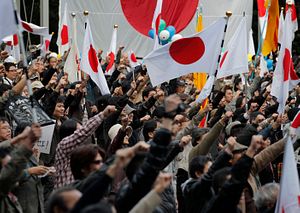Amid the escalating confrontation between China and the United States, criticism about China is spreading across the English-speaking world. Some Western researchers say that the United States and Japan now share a hardline position on China and that Tokyo should welcome Washington’s tough stance towards Beijing with open arms. The reality, however, is not that simple. True, public sentiment in Japan is not positive towards China: At least 80 percent of Japanese view China unfavorably. On the other hand, when asked if Japan-China relations are important, 70 percent or more of respondents say that they are. This can be explained by three underlying factors. First, the two countries have economic relations typified by very close supply chains. Second, there are substantial human relationships across the entire economic community. Third, memories have been formed throughout history.
Public sentiment towards China is quite negative in East Asia, especially among China’s neighbors. This trait is particularly noticeable in countries that have territorial disputes or historical issues with China. Yet these countries also have historical links with China. Moreover, they have substantial tourism, both inbound and outbound, and close economic relations. Numerous statistics show that Japan’s sentiment towards China is similar to that of Vietnam. Many nations deal with their relations with China by trying to balance domestic sentiment and actual economic relations. In other words, negative public opinion about China is offset by a strong dependence on China in economic and other areas. In this sense, China’s neighbors need to monitor the direction of the U.S.-China dispute carefully, rather than welcoming it unconditionally. Should the situation deteriorate, the United States may question these countries’ strong economic ties with China and end its own exchange with them. This is especially true for U.S. allies like Japan.
Japan has sought to keep economics and politics separate, as one of its foreign policy principles. While attaching great importance to its alliance with the United States in a political and security context, Japan occasionally takes a stance that differs from that of the United States, aiming to maintain a certain degree of independence in Asian diplomacy and other aspects. For instance, this is visible in its diplomacy towards Iran. However, Japan must surely recognize the difficulty of pursuing this policy in the face of the growing U.S-China dispute in the technology sector. Technology has both military and economic implications, and as such cannot easily be separated. It is quite conceivable for one product to be regarded as sensitive in military terms and yet at the same time be significant to supply chains in other industries. If U.S.-China friction spills over in this way from politics into the economy, China’s neighbors will face some serious challenges.
For these reasons, any “anti-China” stance in Japan and other nearby countries cannot be discussed without adding some clarifications. This is clearly evident in the poll cited above, in which respondents recognized the importance of Japan’s relations with China even if they did not have a favorable impression of China itself. In the past, the late Professor Masataka Kosaka of Kyoto University suggested that Japan follow the diplomatic principle of maintaining its friendship with the United States while remaining free from conflict with China. Japan will have to clearly and carefully reconcile its views and those of the United States on China, technology and other issues.
Shin Kawashima is a professor at the University of Tokyo.

































